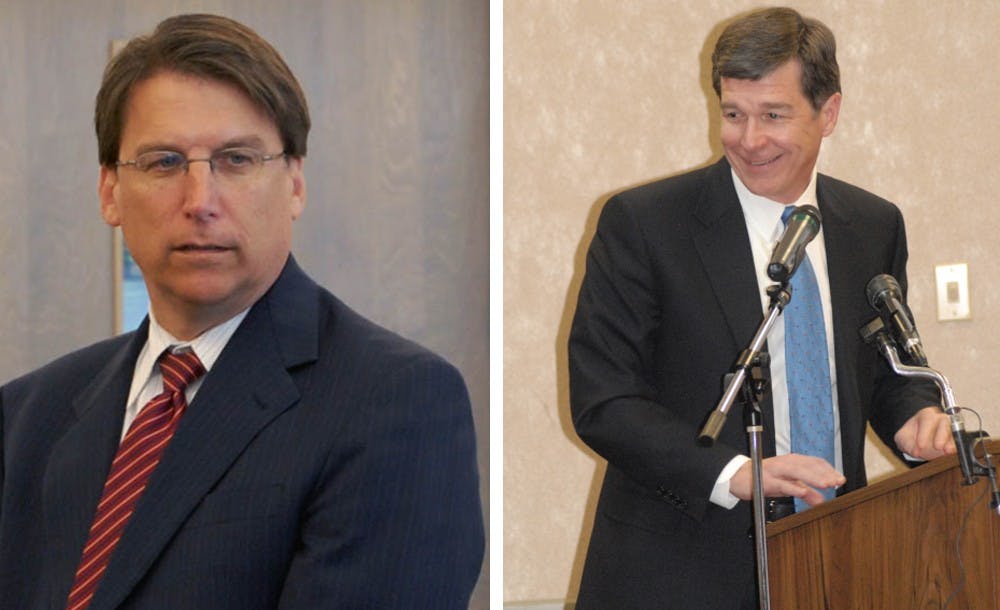Honesty was a central theme Tuesday night as Republican incumbent Pat McCrory sparred with Democratic challenger Roy Cooper at the North Carolina gubernatorial debate.
McCrory has been North Carolina’s governor since 2013, and Cooper has served as attorney general since 2001. The debate, moderated by NBC News host Chuck Todd, highlighted several points of contention between the two candidates. Included were attacks on McCrory’s support for House Bill 2, which restricts bathroom use to a person’s “biological sex,” and on Cooper for backlogs and waiting times at the state crime lab.
Throughout the debate, McCrory criticized Cooper for trying to keep the debate centered on social issues like HB2 instead of economic growth during McCrory’s term. Both candidates also took aim at the other for distorting the truth on several occasions during the debate.
“We need a good jobs governor, not a HB2 governor,” Cooper said.
Cooper described the economic effects of HB2 as “state-government inflicted recession,” noting that it was not the state’s job to prescribe policy on what bathroom to use. McCrory defended the bill, however, saying the issue was started not by Republicans but by “liberals in Charlotte” interfering with privacy by introducing a new definition of gender.
In response to Todd’s hypothetical question on what bathroom Caitlyn Jenner would be allowed to use in North Carolina, McCrory said “if she’s using a shower at the University of North Carolina at Chapel Hill, she’s going to use the men’s shower."
McCrory urged Cooper to “get out of bathroom politics” and to stop using it as an excuse to ignore economic progress during the past three years. As the debate pivoted to economic issues, both candidates accused the other of cherry-picking their facts.
While McCrory touted reducing corporate and income taxes as well as getting rid of a 2.6 billion dollar debt to federal government, Cooper countered that the middle class has not gotten a share of North Carolina’s growth.
“The governor promised people a tax cut, and he came through for the corporations at the people at the top,” Cooper said. “The taxes [on the middle class] are courtesy of Governor McCrory.”
McCrory said that the idea that Cooper cares more about the middle class than he does was an absurd proposition, citing the amount of money Cooper has gotten from interests outside of North Carolina as proof.
Conditions for teachers have also been a major point of contention in North Carolina for several years, with teacher pay 41st in the nation and several teachers leaving the state for better jobs elsewhere.
Cooper emphasized the state of public education in his attacks on McCrory, and McCrory acknowledged that there is room to improve. However, McCrory argued he actually increased the starting salary pay raises for teachers, unlike the two Democratic governors before him.
Hurricane Matthew was also brought up, with both accusing the other of not being prepared to handle disaster. McCrory said Cooper would more likely spend a surplus than hold it for a “rainy day,” while Cooper accused McCrory of diverting money from disaster relief to mount a legal defense of HB2.
McCrory said the accusation was unfounded. The legislature approved the transfer, but his office was not planning on using any of it, he said.
“Having a law license, yet you choose not to tell the truth,” McCrory said. “That’s what’s wrong with politics today.”
McCrory said that despite 15 years as attorney general, Cooper failed to prevent two abortion clinics from performing abortions under abysmal conditions and using unsanitary “utensils.” Those clinics, he said, have now been reopened, but Cooper insisted the Republican leadership has been focused on interfering with what should be a private decision.
“We don’t need state government bureaucrats reviewing women’s ultrasounds,” Cooper said.
Another failure of Cooper’s leadership, McCrory alleged, was continuing wait times and backlogs within the state crime lab. The problem got so bad, McCrory said, that separate parts of North Carolina are looking to create their own crime lab because they are tired of waiting.
“If you can’t handle the crime lab after 14 to 16 years, how are you going to handle state government?” McCrory argued.
Cooper had a different take, noting that he instituted independent investigations to improve the crime lab, and that when McCrory was mayor of Charlotte, he took no steps to fix a similar problem.
Get The Chronicle straight to your inbox
Sign up for our weekly newsletter. Cancel at any time.
With regards to police violence and racial tension, the candidates were clearly divided. In response to a new law making police videos private unless a judge releases them, McCrory emphasized the need to balance the public interest with the constitutional rights of those accused. Cooper, on the other hand, said transparency was of the utmost importance.
“What we need is a govenrnor whose going to work to make sure we have that mutual respect, and part of that respect is transparency,” Cooper said. “The presumption should be that it’s public because the more transparency you have, the more respect you have.”
Near the end of the debate, the disagreement turned to the presidential contest, specifically why McCrory had not revoked his endorsement of Republican nominee Donald Trump, as over 100 other Republican leaders had, after lewd comments Trump made in 2005 came to light.
Cooper said it showed McCrory was unwilling to stand up for women in the state, but McCrory said he could support someone’s policies without endorsing their character traits.
“He needs to have his mouth washed out with soap, and so does [Democratic nominee] Hillary Clinton,” McCrory said. “Maybe she needs to look at a bar of soap the next time she lies.”
According to average polling data from RealClearPolitics prior to the debate, Cooper is ahead of McCrory by 4.6 points.

